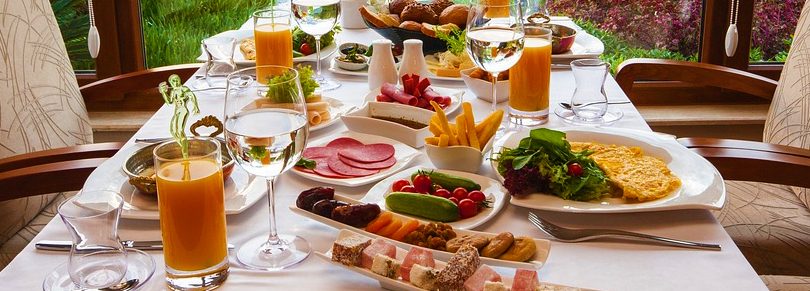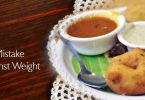The first point is to get your focus right. Holidays are not about eating and drinking without control. So mentally prepare yourself to enjoy some specialties of the place you are visiting but don’t plan to overeat from morning to night. We need to be more responsible and sensible than that with our bodies.
We can’t say “I will just eat whatever I want and come back and go on a diet.” One can easily gain 3-5 kgs in 10 days. So before you set out, make a decision to be sensible and cautious. It is a common practice, if your hotel offers breakfast, to eat a huge breakfast and skip lunch or just have a juice and sandwich and then eat a huge dinner. This is a harmful practice.
In the morning if your body needs three slices of bread but you eat six, the other three are converted into fat and stored. Eat a sensible breakfast like a cup of cornflakes and a cup of skimmed milk. Or 2-3 slices of toast and an egg or 2-3 idlis and sambar. Avoid fried bacon, sausages and heavy pastry or croissants or vadas. Avoid butter. A little jam or honey is not harmful.
A glass of skimmed milk along with the above breakfast will help to keep you full till lunch. Take the fruit served at breakfast along with you and munch on this at 11 am instead of a packet of wafers or chips. Lunch should be the main meal of the day. The specialties of the place are to be enjoyed now and not at night.
Make sure you eat whole-wheat bread or rotis or rice along with a dhal or pulses. Some vegetable and curd or non-veg can be eaten. The meal must be accompanied by a fresh salad which is filling and gives you a supply of vitamins and minerals to keep you fresh and active through the day. Lunch time is also the ideal time to eat your seafood or non-veg as you have the whole afternoon and evening to digest and burn it off.
If you must have a dessert, it is healthier to have it at lunch time and avoid it after dinner.
If you’re opting for Chinese food, you may eat steamed rice or noodle with vegetables and some non-veg but try to include a salad and non-fat yogurt to feel fuller. In a continental situation you may do bread rolls, pasta, or rice with boiled vegetables and grilled non-veg or salad with pulses like channa, double beans, sprouts, etc. and non- fat yogurt.
Tea at teatime with a couple of crackers or marie biscuits is advisable. A fruit at 6 or 7pm is refreshing. At this time a cup of yogurt or a glass of skimmed milk will keep you from overeating at dinner. Dinner should be a light meal. A clear vege- table soup along with whole wheat bread and baked vegetables or rotis with dhal or pulses and lots of salads is a balanced but light dinner.
A glass of skimmed milk or a fruit at bedtime is permitted if you are still hungry. Any fatty food eaten after 6pm is converted into fat in the body at 12 midnight and it is stored away in the fat cells. If you starve the whole day and eat fatty foods in the evening it is useless. I am eating only one meal, you exclaim. But as you sleep all the fat in that dinner will be stored as fat.
Once or twice in those 10 days, you may eat a good dinner but not every day of your vacation. So out of 10 days and 30 meals if you eat only 10 heavy lunches you may come back with no weight gain or only 1kg up. (That you should take off as soon as you are back). The biggest tip however is to keep up your regular walking, don’t stop walking.
Try to squeeze in a 20-30 minute walk in your hotel driveway in the morning or after dinner. Finally drink plenty of water 2-3 liters daily. Alcohol is usually a big part of holidays. Please note that it is very high in calories – 1 glass of beer is about 7 tsps of sugar or 150 calories. 1 large drink (whiskey, vodka, etc.) is equal to 7 tsps sugar or 140-150 calories. 100 ml wine is 6 tsps sugar or 120 calories.
Try not to drink twice in a day. Try not to drink every day. Try to restrict yourself to 2 glasses of beer or 2 large drinks or only two, 100 ml glasses of wine at a time. Try not to indulge in fried and rich non-veg snacks but munch on salad with your drink.





